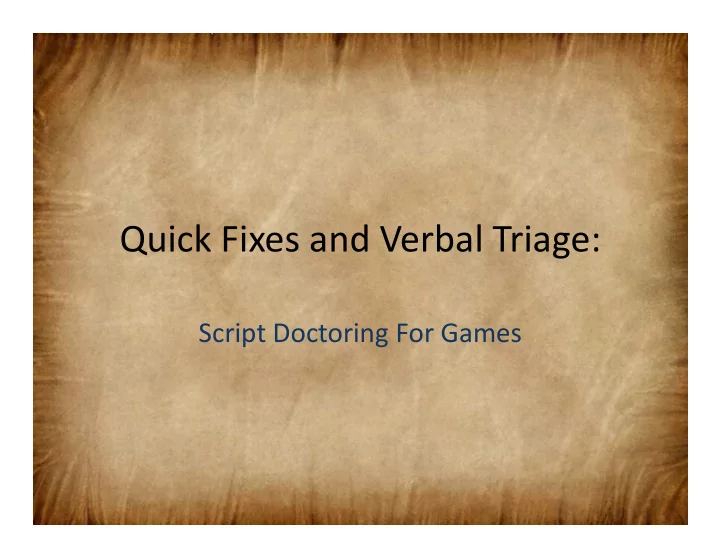

Quick Fixes and Verbal Triage: Script Doctoring For Games
Who Am I And Why Am I Telling You This? � Central Clancy Writer – Ubisoft � Author � RPG Writer � RPG Writer � IGDA Writers’ SIG � Writers’ Summit � Guy Who Likes Writing. A Lot.
(Mandatory Self-Serving Plug)
What Is Script Doctoring? � Script doctoring for games is: � Writing work done on an in-progress project to address existing issues � Fixing problems or adding last-minute content � Can include: � Rewrites � Additional material � Polish passes � …and anything else that’s needed � Not always a “ZOMG!”
Personal History � Started in tabletop RPGs � Planned book carefully � Estimated wordcount � Estimated art needs � Estimated art needs � Sent it to layout � Discovered it was 17 pages short and needed to go to the printer Monday at 6:30 AM
Example: Far Cry � Purely a script polish � Went through dialog & nothing but dialog � Rewrites & edits � Minimal impact on story � Minimal impact on story & character design
Example: Splinter Cell: Conviction � Brought in initially for story assessment � Ended up contributing to re-imagination of entire narrative & doing the bulk of the writing � Not the usual experience Oh, look! It’s Sam again!
Techniques � You can only do what you can do � Don’t chase unicorns � Establish parameters � Define the Expectations � Define the Expectations � What Can/Can’t/Must you do? � What’s high priority? � Don’t waste time on non-essentials � Don’t fight unwinnable battles
Example: Cold Fear � Brought in 4 weeks before recording � Character models & levels already done � Needed: Dialog & story framework � Anything else = wasted effort
Identify Reporting Structure � Step One: Establish one � Whom do you report to? � Who can give you feedback (and make it stick)? � Who assigns and signs off on tasks � Who assigns and signs off on tasks � Who can you safely ignore? � Don’t let anyone mess with the structure � The more people involved, the slower the loop � The slower the loop, the harder script doctoring gets
Example: Dark Messiah of Might & Magic � No clear reporting structure � Meant no clear line of communication � Meant stuff got ignored/people got worked around/general messiness
Integration With the Team � Remember: They were there first � Be aware of history & relationships � Don’t trash existing work � Don’t cast yourself as the Lone Ranger � Don’t cast yourself as the Lone Ranger � Build on anything good that’s already there � Remember: You are there to support the team � The team is not there to support you
Example: Splinter Cell: Double Agent � Writer in place on team when I showed up � Established working relationship � Established working � Established working dynamic � Got a lot of stuff done fast � Got great reviews for writing
Pace � Break the work down � Small manageable deliverables, not one big one � Smaller discreet deliverables = faster feedback � Steady pace means better goal-setting � Steady pace means better goal-setting � Don’t go crazy � You’ve already impressed them enough to get the job � Burn yourself out and there’s no one behind you � Nobody’s paying you for just the first day � Always be prepared to go back in
Example: Blazing Angels � Variations for each SKU meant going back in repeatedly � No closure until it was on the shelf � Effort of going back into the headspace
Writing Technique � Prepare to cut � Develop an eye for what’s essential � Better to make one big cut than lots of small ones � Faster � Easier to paper over one hole than a hundred � Less chance of missing something � Nothing you do is deathless prose � And nothing the other guy did is, either Just don’t be a jerk about it
Example: Ghost Recon: Island Thunder � Initially designed for 10 mission narrative � Short timeframe meant cutting 2 missions – and stitching the rest back together � Nobody noticed…until now Most boonie hats on one box cover, ever.
Short Is Good � Short = Less � Less = Faster � Faster completion � Faster turnaround � Faster turnaround � Faster edits � Done faster � Paid faster (hopefully)
Surprises � They always happen � Deal � Get back to work � You should always prepare for them � You should always prepare for them � Leave “disaster” time in the schedule � Look for potential calamities and head them off � You can’t anticipate everything… � ...but you can anticipate that there will be something – and hedge your bets
Example: Rainbow Six: Raven Shield � First surprise : 9/11 � Required complete story overhaul � Second surprise : Drastic last minute cuts last minute cuts � Third surprise : Change from PC to console storyline
Perfection Is Impossible � If it were perfect, they wouldn’t need you � Do the most good where you can � More effective than polishing tiny gems � Recognize that your work may go � Recognize that your work may go unappreciated � Just do good work
Thank you for your time & attention � Any questions? Richard Dansky Richard.dansky@redstorm.com http://www.richarddansky.com http://www.richarddansky.com @Rdansky http://www.redstorm.com http://www.creatorsofemotion.com
Recommend
More recommend